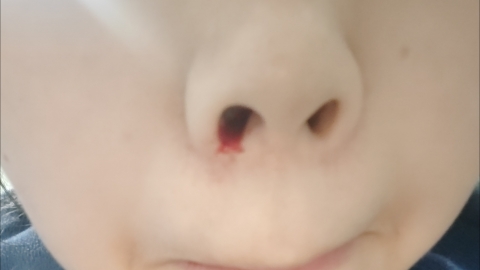Why is there continuous nosebleed, and what should be done?
In general, persistent nosebleeds may be caused by factors such as nasal mucosal dryness, external impact to the nasal cavity, rhinitis, nasal polyps, or abnormal blood clotting function. It is recommended to seek timely medical attention, identify the underlying cause, and improve symptoms under a doctor's guidance through general treatments, medications, etc. A detailed analysis is as follows:

1. Nasal mucosal dryness: Dry environmental conditions or insufficient water intake can cause dryness and cracking of the nasal mucosa, leading to rupture of capillaries and continuous nosebleeds. Nasal saline sprays can be used to moisturize the mucosa, increase water intake, and indoor humidifiers can be used to regulate humidity.
2. External impact to the nasal cavity: Nosebleeds can result from injury to the nasal mucosa and blood vessels due to nose picking or physical impact, possibly accompanied by localized pain. Immediately pinch both sides of the nostrils with your fingers to apply pressure and stop the bleeding, maintaining this for 5–10 minutes. After the bleeding stops, avoid picking the nose again to prevent wound infection.
3. Rhinitis: Allergic or infectious rhinitis can cause nasal mucosal congestion and edema, making the mucosa prone to rupture and bleeding, often accompanied by symptoms such as nasal congestion and runny nose. Patients may follow medical advice to use medications such as budesonide nasal spray, mometasone furoate nasal spray, loratadine tablets, etc., to reduce inflammation.
4. Nasal polyps: Polyps are fragile and easily stimulated, leading to rupture and bleeding, causing persistent nosebleeds, often accompanied by reduced sense of smell and nasal congestion. Smaller polyps can be treated with medications such as fluticasone propionate nasal spray, prednisone acetate tablets, or intranasal decongestant granules as directed by a physician. Larger polyps may require endoscopic nasal polypectomy to remove the lesion and stop the bleeding.
5. Abnormal coagulation function: Platelet deficiency or lack of clotting factors can cause blood coagulation disorders, resulting in persistent nosebleeds, possibly accompanied by skin bruising. Patients may follow medical advice to use medications such as tranexamic acid tablets, vitamin K1 injection, or etamsylate injection to improve coagulation function, while also treating the underlying disease.
In daily life, avoid forceful nose blowing and nose picking to maintain nasal hygiene. Diet-wise, consume more foods rich in vitamin C, such as oranges and kiwifruit, to enhance blood vessel elasticity. During dry weather, strengthen nasal moisturization to reduce the occurrence of nosebleeds.







